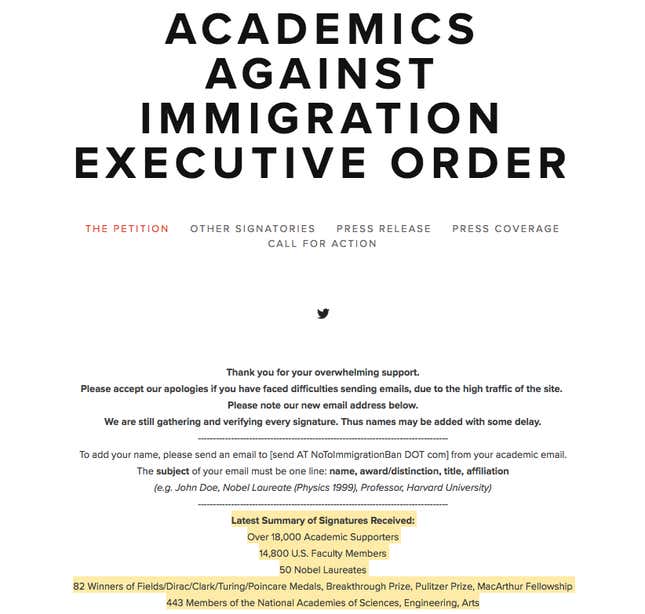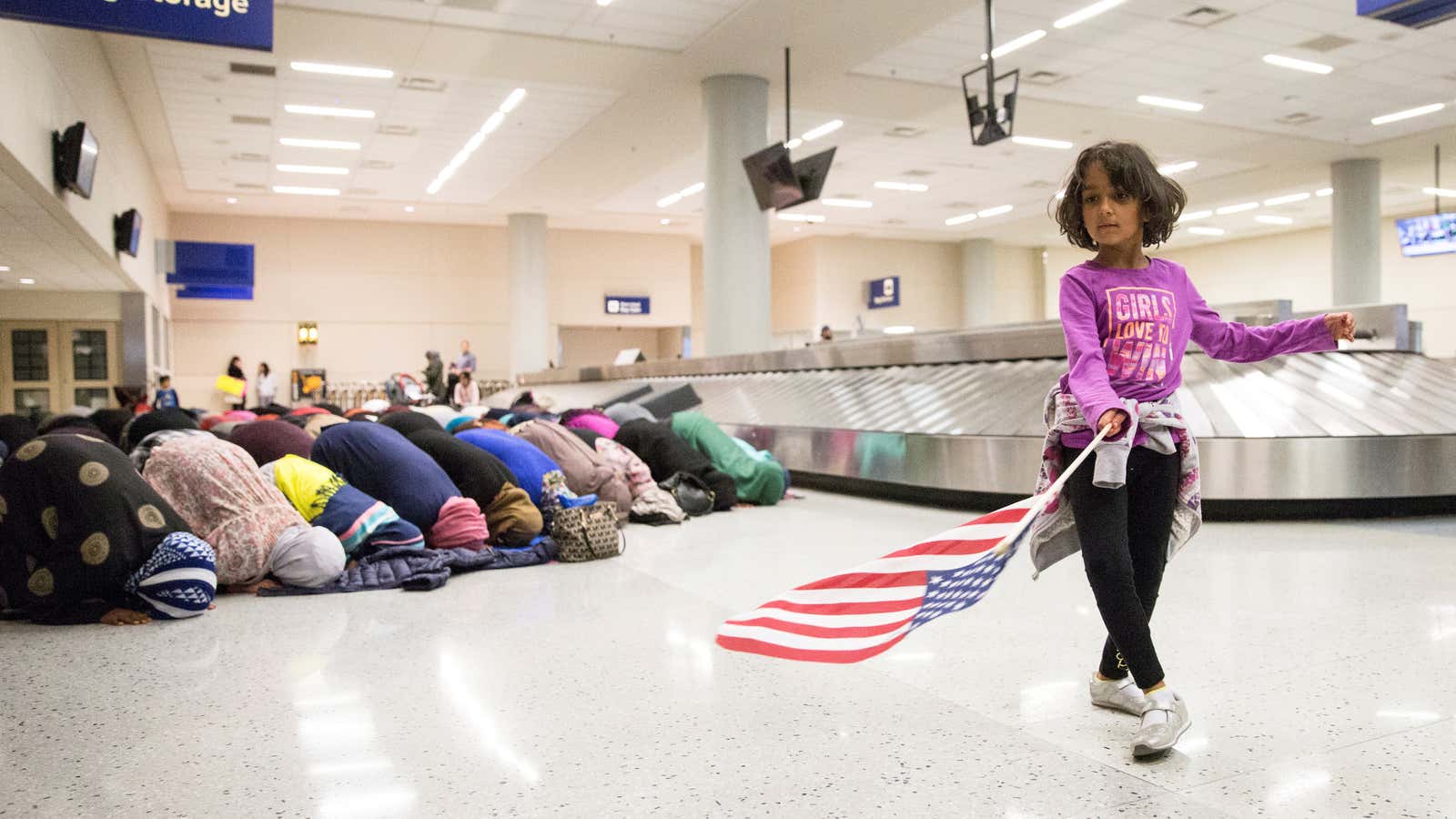“I may cut the Department of Education,” Donald Trump—a year and a half ago, back when he was only a celebrity billionaire, and not America’s 45th president as well—mused, casually, on national television.
Trump has not actually done that. It’d be next to impossible. The US’s Education Department comprises 5,000 employees, a $73 billion annual budget, and is responsible for some 98,000 public schools in the country; as far as federal entities go, it’s firmly cemented.
That doesn’t mean the brash new president—who has been in office for all of two weeks—hasn’t already managed to upend the country’s education status quo as it’s been known for the past several decades. And true to Trump’s declaration at his Jan. 20 inauguration that no American will ever “be ignored again,” his rattling of the nation’s education system, which has only intensified since his arrival at the White House, has left no age group unaffected.
Elementary schoolers (ages 5-10)
For younger students, Trump’s presidency has already taken a toll through psychology, if not yet policy.
Even before he cinched the election in November, teachers all over the country reported a “Trump effect” rippling through their classrooms: a spike in stress and anxiety in students, particularly those belonging to immigrant families or other demographic backgrounds that Trump attacked in his campaign. Post-election, schools saw an immediate uptick in bullying.
“I don’t want to go to America anymore for the next four years,” a 10-year-old child named Kian in London told Quartz, his sentiments echoed by dozens of other kids around the world. Children within the US aren’t doing too well, either, with teachers reporting that many feel threatened—even if they don’t understand why.
Research does show that young kids are strongly affected by presidential elections, often mirroring the attitudes of their parents. No wonder Trump’s physical presence in a classroom causes first-graders to shout “I’m nervous, I’m nervous.”
If young children are upset, their parents and instructors—the people tasked with explaining current events to confused kids and shaping their malleable views on the world—have it even worse.
Middle and high schoolers (ages 10-18)
Billionaire philanthropist Betsy DeVos squeezed through Senate approval on Jan. 31—albeit barely, trailed by no small amount of controversy—and is on her way to be confirmed as Trump’s pick for US education secretary. While neither DeVos nor Trump has yet announced education policy plans, such policies will have their strongest effect on students in the most formative schooling years: middle school and high school.
Along with slashing the entire department, Trump has suggested he would like to get rid of the Common Core, a set of uniform curriculum standards followed by public schools around the country. (It’s not certain he has the power, but if he does, a massive teaching overhaul would need to take place.)
DeVos’s most well-known education stance is her support of school choice and school vouchers: the idea of having federal money follow students around to classrooms of their parents’ choosing, which include charter schools and privately funded independent schools, not just geographically-assigned public institutions. She pushed school choice in her home state of Michigan, but the experiment has been deemed a failure that actually worsened students’ academic performance, which doesn’t bode well for how well it might play out on a national scale.
Separately, in her philanthropy, DeVos has quietly championed a religious and creationist idea called “intelligent design,” dismissed by most teachers as junk science—and causing worry that she could subvert the teaching of evolution in schools. She’s also a backer of an odd form of behavioral brain therapy (paywall). Let’s hope that doesn’t become part of the national curriculum.
Aside from what can be drawn from her personal background, it’s difficult to predict what other ways DeVos could reshape education. Unlike her predecessors, she has no personal experience attending public schools, nor has she ever administered or taught at one.
All the uncertainties are ramping up anxiety amongst parents and administrators. A history teacher was recently suspended for comparing Trump to Adolf Hitler, for example. And history teachers at large actually have the most influential pulpit in education right now—a bizarre shift in and of itself.
University students
The true battleground for education under the Trump administration is the American university, in several ways:
- College students, often thought of as being overwhelmingly liberal, are having to grapple with Trump’s win and confront arguments they’ve spent years insulating themselves against. (See: Yiannopoulos, Milos.)
- Campuses are being physically disrupted by a wave of seemingly unceasing protests.
- Trump’s administration believes that Obama had too much of a hand in social issues; when asked about her stance on sexual-assault policies, DeVos said it is “premature” to take a position. The federal government will likely step back from the realm.
- International students are showing hesitance at applying to schools in the US, given the president’s staunch lack of welcome to them. On the other side of this are American college students fleeing to Canada.
- Trump champions for-profit institutions. For-profit schools are set to flourish under him, despite the industry’s controversial track record of price-gouging or misleading students. Trump’s own for-profit university resulted in acrimony, lawsuits, and a huge settlement.
- Along those lines, the president set up a task force this week to specifically pare back accountability regulations and “give colleges and their accrediting agencies more leeway.”
- A flood of elite university presidents are positioning themselves, however subtle their language may be, against Trump and his policies on immigration, among other matters. Professors are bolder yet. That the US’s leading faculty members so vigorously oppose the national president isn’t too powerful on its own—but it’ll have a stark limitation on any research or academic ventures Trump’s administration might want to pursue.

Graduate students
For once, graduate students are in a glaring spotlight, thanks to Trump’s recent ban on immigration to the US from seven majority-Muslim countries.
If Trump’s travel ban holds, it’ll halt the arrival of many international graduate-level students in the country, which will only end up squeezing the US’s pipeline of innovation. “The schools face a financial loss at one level, but a bigger one is the loss of talent, research, the contributions these students will make to the advancement of the field,” researcher Rahul Choudaha tells Quartz.
Some policy analysts expect the immigration ban to eventually broaden and include several other countries, which would further stunt the flow of talent to the nation—a channel that Silicon Valley desperately needs, not to mention hospitals and blue-collar industries like construction. So much for making America great again.
